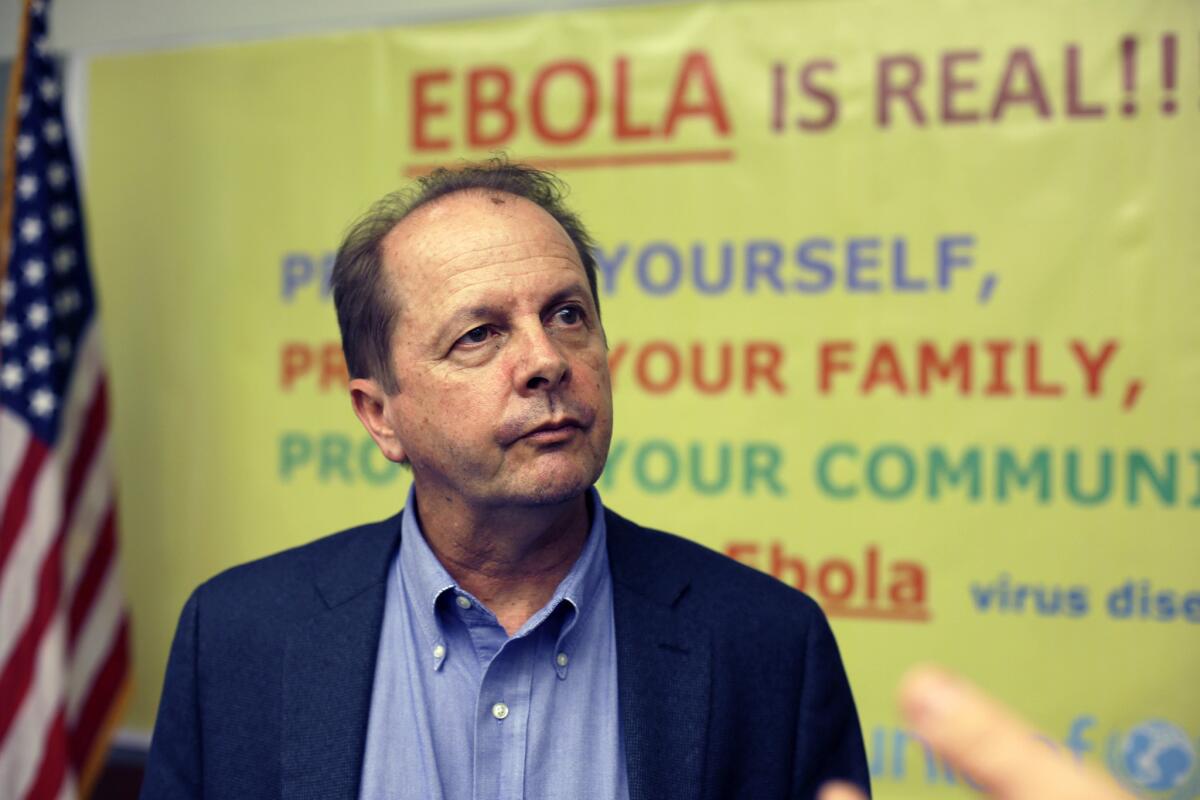A whisper of hope in Liberia’s fight against Ebola deaths

- Share via
Reporting from Monrovia, Liberia — There’s a cautious, hopeful whisper among humanitarian workers and epidemiologists working to contain the Ebola virus in Liberia. Are there embryonic signs, they wonder, that indicate the crisis is ebbing?
For several days, fewer bodies have been buried, calls to the Ebola hotline reporting cases or bodies have declined, and several dozen Ebola treatment beds have become available because of an increase in supply.
But experts are cautious: The epidemic has seen many ups, downs and false dawns. The decline in burials could mean something else, such as fewer deaths being reported, or funerals being handled secretly, one of the major means by which the disease is spread.
Tom Kenyon, director of the U.S. Centers for Disease Control’s Center for Global Health, said Wednesday that there were signs of progress in Liberia’s response to Ebola, but emphasized that it was too early to say the spread of the disease was slowing.
“We always look for a glimmer of hope,” Kenyon said. “I would like to call it cautious optimism but it’s too soon to say it’s on a downward trend.”
Outside the gates of government hospitals and treatment units, it’s difficult to sense such optimism.
At one treatment unit known as the Island Clinic, a doctor stood at the top of a high wall, gathered a group of patients underneath — some barely able to walk — and shouted down questions about their conditions from behind curls of razor wire.
Al Haji Massalay, 40, had been lying for four hours on the concrete driveway, wincing and sweating. He’d been vomiting, had diarrhea, and, too weak to move, he lay prostrate, waiting to be admitted.
“I’m feeling bad,” said his wife, Fatu Sanyon, 38, saying it was wrong to leave severely ill patients lying in the baking sun for hours. “They should help him. They should treat him to get well.”
Hand shaking, he passed his cellphone to his wife, who took it with little thought of infection, in denial that it might be Ebola. When the doctor finally called Massalay, he staggered through the gate with several others, where a man in a protective suit sprayed their shoes and clothes.
Nearby, Mohammed Dorley, 33, scanned a list marked “Expired Patients” looking for his 14-year-old daughter’s name. At the bottom, in red marker, were the words “These patients did not make it!” The youngest was just 4 years old. Dorley, who’d lost everyone in his family but two children, hadn’t heard anything about his daughter’s fate since she entered the clinic a week before.
Marie Nyentue, 37, scanned the list Tuesday, looking for her son Emmanuel’s name, which wasn’t listed. Like Dorley she’d had no news. She managed to contact a nurse in the center who checked her son’s bed Wednesday.
His medical chart was still there, but the bed was empty. The nurse told Nyentue that meant her son was dead.
The scene was little better at John F. Kennedy Medical Center, the city’s largest hospital.
Ambulance driver Konah Massaquoi shouted angrily at the gate that he had been driving four patients from hospital to clinic to hospital for hours, only to have them wait hours outside the hospital gate for admission.
In the ambulance, one desperately ill patient was covered with vomit and excrement, with another patient collapsed close by.
Two other man had gotten out, and were waiting nearby. Milton Borteh, 21, doubled over, retching.
“Right now, I need treatment,” he said weakly. He’d treated himself for malaria and typhoid for several days before seeking help.
Patrick Faley, 32 had been sick for two weeks, but a private clinic told him it was typhoid. His typhoid medicine didn’t help.
Faley sat outside the hospital Wednesday, clothing in disarray, an expression of despair on his face, terrified that he might have picked up Ebola from the other patients in the ambulance. He was confident he didn’t have Ebola, but wondered why he was going downhill so fast.
“One thing is if you are sick with Ebola or not, you will still have the stigma,” he said.
One positive trend is the increase in beds at Ebola treatment units in Liberia. Assistant Health Minister Tolbert G. Nyenswah said in an interview Wednesday that the number of beds had increased from fewer than 200 to 500 in three weeks and there were plans to increase it to 700 in coming weeks.
Kenyon said that the number of deaths had always been under-reported. It took just one group of people in Liberia to attend one funeral, handling the body of a loved one, to infect dozens of others.
“We do know that there’s always been under-reporting and there’s major stigma with this disease,” Kenyon said. “We know that with other diseases, when there’s stigma it drives it underground. Steps need to be taken to address the stigma.
“I think the power of bringing this under control is in the hands of Liberians,” he said.
Twitter: @RobynDixon_LAT
More to Read
Sign up for Essential California
The most important California stories and recommendations in your inbox every morning.
You may occasionally receive promotional content from the Los Angeles Times.










